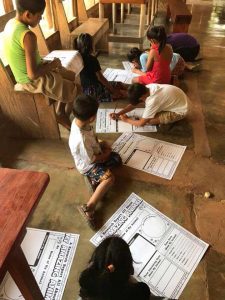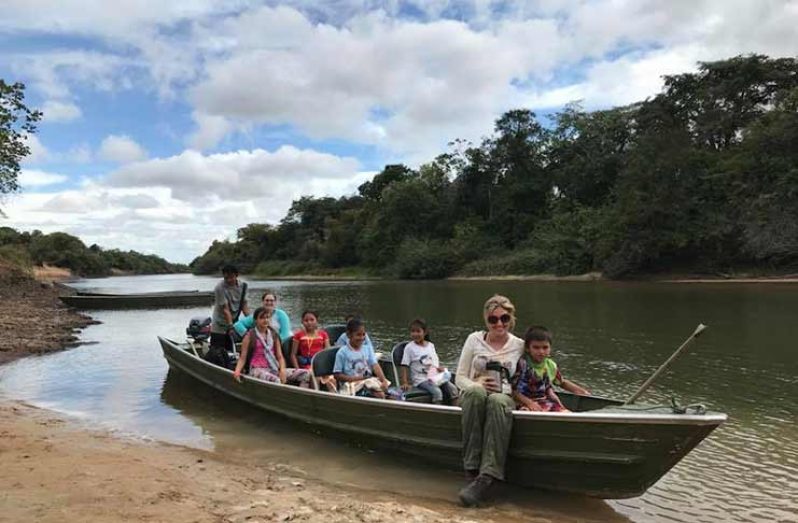THE village of Yupukari in Region Nine (Upper Takutu-Upper Essequibo) is leading the way in the preservation of the world’s endangered giant river otter, thanks to the help of the Save the Giants (Otters) team.

Founder of the Save the Giants (Otters) team, Christina Ward, met up with the Guyana Chronicle to tell of the works being conducted locally to protect one of Guyana’s many giants from becoming extinct.
Christian is an artist and life-long animal conservationist with a background in animal management and wildlife rehabilitation.
In 2016, she took a break from her job at Zoo Atlanta, in the United States, to Guyana to conduct a giant otter population survey near the Karanambu Lodge on the Rupununi River.
When she left for home, Christina was inspired by the hope of raising money to continue the work of otter conservation in Guyana.
As such, she launched her own art business, Colours for Conservation, from which all proceeds from its sale of original artwork and merchandise will go towards supporting conservation-based organisations and projects.
“I decided that I wanted to change the course of my life and I quit the zoo and I started Save the Giants and have been working in Guyana for about three years now,” she said.
With her focus on the country’s giant river otters, Christina said that the animals remain well below the threshold of endangered animals today.
“Unfortunately, giant otters are the most endangered otter species on the planet. Our counts right now working with the International Union for Conservation of Nature show that there are around 2000-4000 in total left in the world. Pretty much, at this point, without human intervention to try to help the population increase, there’s a pretty good chance we may lose these guys,” she said.
Guyana, however, is in a better position compared to its neighbours as a result of its connected waterways which prevent “genetic bottlenecking”, which occurs when giant otters live in only one particular area.
“Guyana is unique because our landscapes, unlike Brazil and Venezuela and other at- range countries, is very much connected in terms of gene flow so there is really nothing like gold mining or human development [in these areas], so the threats here are not as major as they are in the other countries,” she said, adding: “It’s not to say that it couldn’t become a major issue for the giants right now…because if all the giant otters in Brazil or Venezuela die off and we only have the animals in Guyana, eventually, that will happen because we need dispersers from family groups to pass on their genes by travelling to different places.”
This possible threat is why Christina and her team have increased their efforts at creating awareness about giant otters in Guyana.
In the hinterland communities such as Yupukari in Region Nine, the Save the Giants (Otters) team has begun to engage with young children and fishermen in the village.
“We’ve really been working with the kids in the village helping them re-establish their Wildlife Club. We just bought a boat so that the kids will always have access to go on the river instead of it just being us on the water by ourselves looking for otters, we want the kids to do so and anybody else from the village,” she explained.
However, when it comes to the fisher folk there is the challenge of helping them to understand the nature of the animals–often attracted to the fishing activity–which in turn leads to violence meted out by fishermen.

As such, Kenneth Butler, the team’s field manager said that a lot of the work being conducted revolves around assisting the community to develop closeness with the animals.
“It’s not so much of having them domesticated, it’s more of seeing them and not being afraid to approach and allowing them to not be afraid of you as well,” he said, adding:
“One of the conflicts that we’re dealing with, and where the education aspect comes in, is fishermen who tend to leave fishes in boats and the otters come across and they tend to go into the boat for the fish and then you have this clash between fishermen and giant otters.”
He explained that these individuals are being taught that when fishing in a giant river and otter area they should refrain from using gill nets and never leave fish unattended.
In addition, the team also held Domestic Animal Welfare clinics this year in the region where community members were invited to bring their pets for deworming, mange baths, and vaccination as pets, too, can contribute to the well-being of wild animals.
“The health of the domestic animal population can really affect the health of the wild animal population. They bathe in the water, they urinate in the water, they defecate in the water, so ‘anything’ that is in the domestic pets is going to, ultimately, end up in the water,” Christina explained.
In the coming year, she and her team plan to construct a Wildlife Centre for the Yupukari village which will provide a central hub for science experiments; the development of lab skills and awareness about Guyana’s wildlife.
The team also hopes to soon include the village of Mapari, and is working to raise funds so that representatives from villages along the Rupununi River, through workshops, can learn how to conduct their own otter surveys.
“We would provide them with the equipment they would need and we would give them a stipend to conduct these surveys in their particular region,” Christian said.
Partnerships have also been forged with the University of Guyana (UG), for the possible initiation of an internship programme for biodiversity students to work along with the team.
In the meantime, the Save the Giants(Otters) team advocates for additional support from persons of other regions of the country, looking to become involved in the protection of Guyana’s wildlife.




.png)









